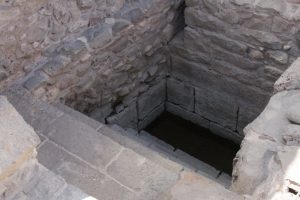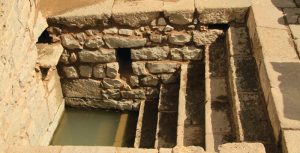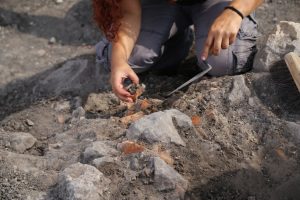Archaeologists unearthed a fourth rare ritual bath at the ancient city of Magdala, Israel, along with a unique carved stone point, which suggests the site may have been the seat of one of the priestly families that fled Jerusalem to the Galilee after the fall of the Second Temple at the hands of the Romans in 70AD.

The importance of the site as a religious centre first came to light in 2009 after remains of an extremely rare early synagogue were unearthed, possibly being one of only eight synagogues identified so far in Israel as dating from the first century AD. Within the ruins the so-called Magdala Stone was found – a Torah reading table sculpted in stone with reliefs depicting a seven-branched menorah and possibly the Jerusalem Temple. The stone also has four horn like protrusions that recall the horns of sacrificial altars, providing a link between the site and the contemporaneous form of “Temple cult” in Jerusalem. On the course of excavations in recent years, archaeologists unearthed ritual baths (called mikva’ot). Their archaeological context is believed to be similar as the priestly residence uncovered at the Herodian Quarter in Jerusalem. The ritual baths at Magdala were uniquely filled with groundwater, and not collected rain water or fuelled by other natural spring systems.

Additional findings pointing to ritual use include chalk stone vessels that were used to keep purified water necessary for ritual purposes, oil lamps like those used by priests in Jerusalem, and a shovel that is an exact copy of the ones used to pick up ember incense ashes at the Temple. In addition to the four ritual baths and early synagogue, the team or archaeologists lead by Marcela Zapata-Meza has uncovered a marketplace, fishing pools, mosaics, around 2400 coins, a rich domestic area, wharf, and harbour.

(after The Times of Israel, Israel Antiquities Authority & Shmuel Bar-Am)